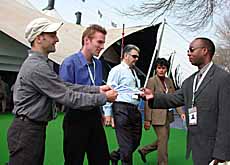Jetting off with a clean conscience

Earth Summit delegates are being urged to offset the environmental cost of their trip to South Africa by purchasing a "climate ticket".
The ticket is the brainchild of Renat Heuberger, a Swiss scientific researcher at the Federal Institute of Technology in Zurich.
Heuberger is attending the summit in an attempt to persuade international delegations to compensate for the carbon dioxide generated on their journeys by air to Johannesburg.
The founder of “myclimate”, a non-profit organisation which sells the climate tickets, Heuberger says the ecological impact of long and short-haul air traffic is often overlooked.
“Air traffic and its C02 emissions have a big impact on climate,” Heuberger told swissinfo.
“So we decided to do something about this, and that is how we came up with the idea of the climate ticket,” he adds.
Buy before you fly
Those behind the initiative – which is backed by an international advisory board of scientific experts – are trying to encourage air passengers to purchase the ticket before or after they travel.
Climate tickets are sold at a rate of around $6 per hour of the flight, meaning that a 10-hour return trip to Johannesburg from Zurich, for example, would cost each passenger around $120.
“Our calculations are based on the price we need to really ensure a full compensation of the total climate impact,” Heuberger says.
myclimate – which is supported by the Federal Institute of Technology – claims that 50 litres of kerosene are consumed and 125 kilograms of carbon dioxide are emitted per passenger for every hour he or she is in the air.
Solar power
Money raised through sales of the voluntary ticket is ploughed into renewable and solar energy projects both in Switzerland and elsewhere in the world.
“The money is spent on projects which prevent further C02 emissions,” says Martin Streicher, another member of the myclimate team.
“One example is in Costa Rica, where we installed solar panels at a school so that water used for showers could be heated by solar energy and not by a diesel generator,” explains Heuberger.
In future, the organisation says air travellers starting or finishing their journey by air anywhere in the world will be able to select which specific project they would like to support when they pay for their climate ticket.
Positive response
The climate ticket project first took off in March of this year, but the Earth Summit marks the first major international opportunity for its founders to test the popularity of the scheme.
Streicher says he has so far been pleased by the positive reaction of many of the conference delegates.
“We’ve seen that people are conscious that the cost of an air ticket is not paying off the cost of environmental damage they are doing [by flying],” he says.
“It’s a step-by-step approach. At the moment, you can buy a ticket at our stand [in Johannesburg] or on our website,” he adds.
“Further down the line, it would be good to persuade travel agencies to give their customers the option of buying a climate ticket when they book a flight.”
Lobbying airlines
Heuberger says the organisation’s next task is to lobby international airlines to include the cost of the climate ticket in the overall price of an airfare.
“I hope that one day airlines will include in their ticket prices a tax which would cover the real environmental damage of air traffic,” he says.
But are the founders of the climate ticket expecting the Swiss foreign minister, Joseph Deiss, to dig deep into his pocket when he steps off his plane in Johannesburg in time for summit negotiations on Monday?
“If he comes to our stand, we definitely want to inform him and tell him about our climate ticket,” says Streicher, “and we hope he’ll buy one.”
swissinfo, Ramsey Zarifeh, Johannesburg
Earth Summit delegates are being urged to offset the environmental cost of their trip by air to South Africa by purchasing a “climate ticket”.
Those behind the project claim that 50 litres of kerosene are consumed and 125 kilograms of carbon dioxide are emitted per passenger for every hour he or she spends in the air.
Money raised from the sale of climate tickets is used to fund renewable energy projects in Switzerland and around the world.

In compliance with the JTI standards
More: SWI swissinfo.ch certified by the Journalism Trust Initiative








You can find an overview of ongoing debates with our journalists here . Please join us!
If you want to start a conversation about a topic raised in this article or want to report factual errors, email us at english@swissinfo.ch.